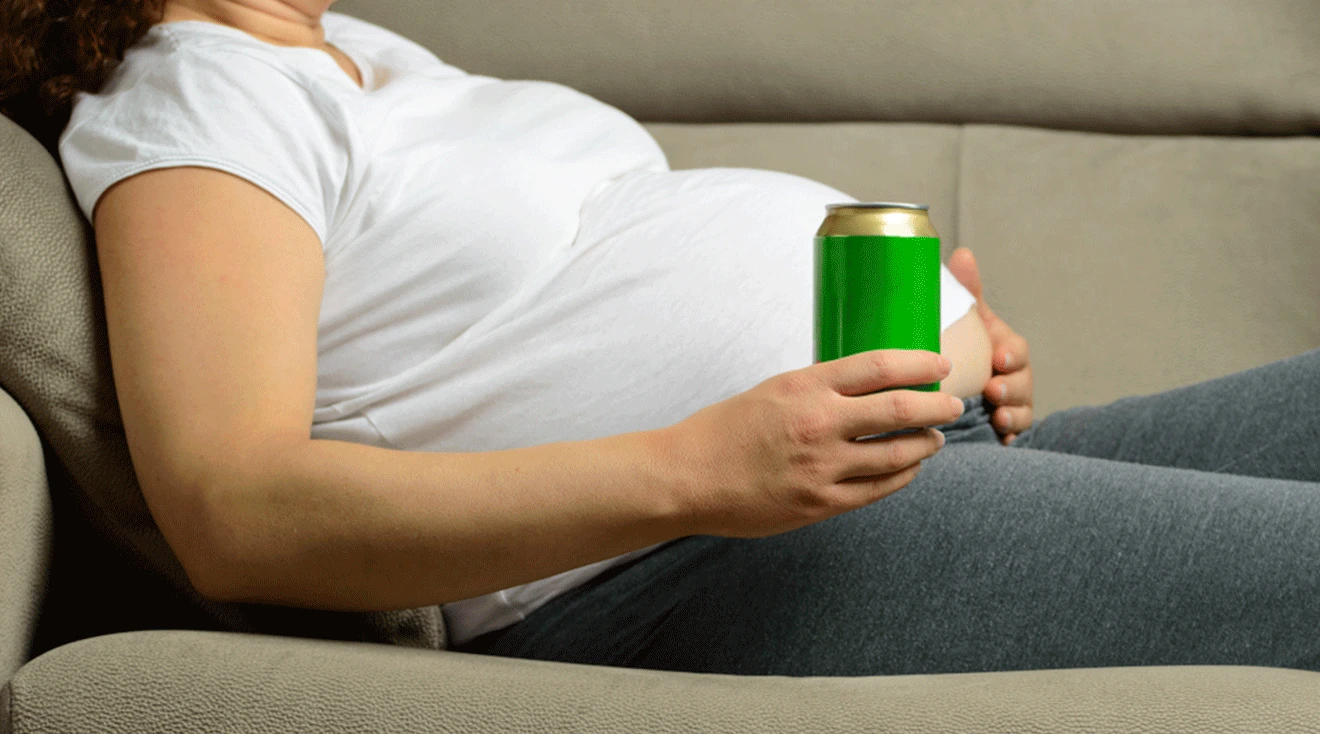Can You Drink Energy Drinks (Like Red Bull) While Pregnant?
I knew I was pregnant with my third child before I took a pregnancy test because of one symptom that felt unmistakable to me: crushing fatigue. Lying on the couch with my toddler next to me, I told my husband I couldn’t believe how tired I felt. Then, like a lightning bolt, it dawned on me that the last time I had been this tired, I was pregnant with the kid who was currently dropping cracker crumbs in my lap while he watched Sesame Street.
Because fatigue is such a common symptom, you might find yourself asking: Can you drink energy drinks while pregnant? If anyone needs the eye-opening, adrenaline-pumping effects of an energy drink, it’s expectant moms, right? But in a cruel twist of irony, it’s best to avoid many of these beverages during pregnancy. Not only can they contain high amounts of caffeine that may be unsafe for baby, they’re also often loaded with processed sugar and may include herbal ingredients that aren’t pregnancy-safe.
That doesn’t mean all energy drinks are off-limits—but you should choose your beverage wisely if you’re expecting. Here’s what to know about the risks, and what you should look for if you need a pregnancy-safe energy boost in a bottle or can.
- Energy drinks aren’t automatically off-limits during pregnancy, but it’s important to consider factors like caffeine content: You should stay at or under 200 milligrams of caffeine per day during pregnancy.
- Energy drinks can contain high amounts of added sugar, which can be dangerous for pregnant people with gestational diabetes, or those with existing diabetes.
- Some herbal ingredients in energy drinks haven’t been well-studied for pregnancy, so it’s best to steer clear (or ask your healthcare provider).
Energy drinks are drinks with caffeine, sugar and often herbal stimulants to boost your alertness. They’re considered a dietary supplement and usually claim to provide mental clarity, better exercise performance or higher productivity on top of increased energy levels, per the National Center for Complementary and Integrative Health (NCCIH). Many of them are also infused with vitamins and minerals to increase their benefits and nutritional value.
Since you can have caffeine during pregnancy in moderation, energy drinks are not automatically unsafe or off-limits, says Greg Marchand, MD, FACOG, an ob-gyn and expert in minimally invasive gynecologic surgery in Arizona. However, any caffeinated beverage can be dangerous if you consume it in extreme amounts, so it’s important to follow your healthcare provider’s recommendations about how much caffeine you should have while pregnant.
The American College of Obstetricians and Gynecologists (ACOG) says that moderate caffeine consumption doesn’t seem to be a major risk factor for pregnancy complications like miscarriage or preterm birth. ACOG defines “moderate” caffeine consumption as less than 200 milligrams per day, which is equal to about one 12-ounce cup of coffee or two 8-ounce cups of black tea, says Shalini Shah, IBCLC, a doula at Millie Clinic in Berkeley, California.
Obviously, caffeine content varies by drink, so you’ll want to read labels. Moreover, it’s important to know that the added sugar and herbal ingredients in energy drinks may be more problematic than the caffeine content. (More on that below.)
You may want to check with your healthcare provider before drinking Red Bull while pregnant. You’re okay when it comes to caffeine content: A single 8.4-ounce can of Red Bull contains about 80 milligrams of caffeine, while a 16-ounce can has about 148 milligrams. But it’s also worth mentioning that Red Bull contains about 1,000 milligrams of taurine; this amino acid is considered safe for pregnant women to consume naturally in their diet, but there’s limited research demonstrating its safety as a supplement during pregnancy or while breastfeeding, per Brigham and Women’s Hospital.
Even though certain energy drinks only have about as much or less caffeine as a cup of coffee, there are still some risks associated with drinking them during pregnancy. According to Shah, your body takes longer to process caffeine during pregnancy, so you might feel its effects—like jitteriness, increased heart rate and digestive discomfort—more strongly.
There’s also the question of how caffeine intake may or may not affect baby. While experts are confident that moderate caffeine intake isn’t associated with pregnancy loss or preterm birth, studies have turned out mixed results when it comes to fetal growth: Some show moderate caffeine intake is associated with a lower birth weight, while others don’t. Meanwhile, high caffeine intake has been more reliably linked to lower birth weight in babies.
Caffeine aside, there are other risks associated with energy drinks. Jillian LoPiano, MD, MPH, FACOG, an ob-gyn and the chief health officer at Wisp, says they can contain high amounts of added sugar, which may be dangerous for expectant moms with gestational diabetes or pre-existing diabetes, and may include herbal ingredients that haven’t been well-studied or shown to be safe for pregnancy, like ginseng, green tea extracts and taurine, among others.
A very small amount of caffeine is transferred to baby through their mother’s breast milk, which makes it generally safe to drink caffeinated beverages while breastfeeding, says Marchand: “It’s very different than when a baby is still gestating inside you and receiving the full dose of everything you ingest.”
Caffeine consumption guidelines for breastfeeding moms vary, with the Centers for Disease Control and Prevention (CDC) recommending a limit of around 300 milligrams per day, while some other sources suggest as much as 400 or 500 milligrams per day is likely safe. What’s more important is baby’s behavior: Very high amounts of caffeine could cause them to become fussy, irritable or have trouble sleeping, at which point you may want to try lowering your intake to see if baby seems more comfortable.
Frequently Asked Questions
What’s the best energy drink during pregnancy?
There’s no single energy drink that’s deemed great for pregnancy, but if you’re looking for a relatively safe option, choose one with 200 milligrams or less of caffeine per serving and a minimal amount of added ingredients, including sugar. For example, a 12-ounce serving of Zevia contains about 120 milligrams of caffeine, no added sugar and no herbal ingredients.
Can I drink Gatorade while pregnant?
Yes, sports drinks like Gatorade are safe during pregnancy, says Marchand, who notes that they’re not only a great way to stay hydrated but the preferred beverage of many first-trimester moms suffering from morning sickness and needing to replenish their electrolytes. Just keep in mind that many sports drinks contain high levels of sugar, though many brands have low-sugar and no-sugar varieties.
Can you drink Monster Energy drinks while pregnant?
A standard 16-ounce can of Original Monster Energy contains about 160 milligrams of caffeine, putting it under the recommended daily limit for pregnancy. But it also contains a huge amount of sodium and added sugars (54 grams!), as well as around 1,000 milligrams of taurine. Furthermore, there are also some varieties of Monster drinks (like Java Monster) that contain far more than 160 milligrams of caffeine, so again, make sure you’re always reading the nutrition labels and picking your energy drink carefully. Some labels call out that it’s not recommended for pregnant women.
Can pregnant women drink BODYARMOR?
Body Armor sports drinks are similar to Gatorade (no caffeine, but varying amounts of added sugar), so for the most part, they should be okay to consume in moderation. Just be aware that most Body Armor sports drinks also include B vitamins, which are typically safe and often beneficial during pregnancy, but could be contraindicated for some women in supplemental form. Ask your provider if you have questions about the B-vitamin content in Body Armor.
Can I drink C4 while pregnant?
C4 energy drinks have no added sugars, but they’re on the higher end of the caffeine scale, containing 200 to 300 milligrams per 12-ounce serving. They also include a variety of different vitamins and minerals as well as several herbal ingredients that don’t have research supporting their safety during pregnancy. In fact, the makers of C4 specifically include a warning that some of their beverages should not be consumed by pregnant or breastfeeding women, likely due to the lack of information about their ingredients’ safety. Be sure to ask your healthcare provider about any specific C4 drink you’d like to consume.
Can I drink Alani Nu while pregnant?
Alani Nu is a dietary supplement brand that makes energy drinks and protein shakes, among other nutritional products. Their energy drinks contain about 200 milligrams of caffeine per 12-ounce serving, which puts you at the recommended daily limit, but they’re relatively lower in sugar than many other brands and don’t include any added vitamins or herbal ingredients. As long as you’re staying within the caffeine limits, they’re a pretty safe bet.
Can you drink Prime Hydration while pregnant?
Prime Hydration drinks are caffeine free and most varieties are low in sugar. Similar to Body Armor drinks, however, many Prime Hydration varieties contain added B vitamins, and their original hydration line contains branched-chain amino acids (BCAAs), which some studies have found to be potentially problematic in high amounts during pregnancy. Because there’s little research about the safety of BCAA supplementation in drinks, it’s best to ask your provider before popping open a Prime Hydration. It may not be your best option during pregnancy.
Can you drink Celsius while pregnant?
There’s about 200 milligrams of caffeine and zero sugar in the original Celsius energy drinks, but there are also a handful of herbal extracts, vitamins and minerals (like chromium), which may or may not be safe during pregnancy. There are also other varieties of Celsius, like Celsius Essentials, which are sold in larger cans, contain more caffeine (270 milligrams), and add amino acids, which—as we’ve noted—don’t have a well-studied safety profile for pregnancy. Furthermore, the company says not to consume during pregnancy.
Many energy drinks aren’t completely forbidden during pregnancy. But given the caffeine, sugar and questionable content, it might be best to curb your energy-drink habit or hold off for now.
“Avoiding energy drinks during pregnancy is the safest option, but if you do plan to consume them, I’d recommend reading the ingredients of an individual drink and discussing it with your healthcare provider first,” says LoPiano.
Please note: The Bump and the materials and information it contains are not intended to, and do not constitute, medical or other health advice or diagnosis and should not be used as such. You should always consult with a qualified physician or health professional about your specific circumstances.
Plus, more from The Bump:
Jillian LoPiano, MD, MPH, FACOG, is an ob-gyn and the chief health officer at Wisp. She earned her medical degree from George Washington University.
Greg Marchand, MD, FACS, FICS, FACOG, is an ob-gyn and expert in minimally invasive gynecologic surgery, as well as the founder of the Marchand Institute for Minimally Invasive Surgery in Arizona. He leads the Society of Laparoscopic and Robotic Surgeons-accredited fellowship at Steward Health. He earned his medical degree from Spartan Health Sciences University in St. Lucia.
Shalini Shah, CBD, CPpD, IBCLC, is a doula at Millie Clinic in Berkeley, California.
American College of Obstetricians and Gynecologists, Moderate Caffeine Consumption During Pregnancy, August 2010
BMC Medicine, Maternal Caffeine Intake During Pregnancy Is Associated with Risk of Low Birth Weight: A Systematic Review and Dose-Response Meta-Analysis, September 2014
Brigham and Women’s Hospital, Taurine, August 2023
Centers for Disease Control and Prevention, Maternal Diet and Breastfeeding, February 2024
National Center for Complementary and Integrative Health, Energy Drinks, July 2018
National Institutes of Health, Moderate Daily Caffeine Intake During Pregnancy May Lead to Smaller Birth Size, March 2021
National Library of Medicine, Drugs and Lactation Database, Caffeine, January 2024
Nutrients, Associations of B Vitamin-Related Dietary Pattern During Pregnancy with Birth Outcomes: A Population-Based Study in Northwest China, January 2022
Nutrition & Diabetes, Correlation Between Newborn Weight and Serum BCAAs in Pregnant Women with Diabetes, June 2024
The Journal of Clinical Endocrinology and Metabolism, Branched-Chain Amino Acids and Their Interactions with Lipid Metabolites for Increased Risk of Gestational Diabetes, July 2022
Learn how we ensure the accuracy of our content through our editorial and medical review process.
Navigate forward to interact with the calendar and select a date. Press the question mark key to get the keyboard shortcuts for changing dates.





















































